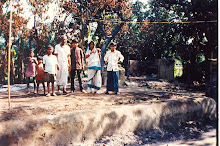
Source: Bengali Newspaper of Dhaka, Bangladesh

Debnath Family Memorial

Debnath Family Memorial
On September 24, 1989 all the Bangladeshi papers printed a story which highlighted the plight of minority Hindu community in that Muslim majority land. The story is about a dirt-poor Hindu Mrs. Birajbala Debnath and her family of Nadirabad village of the Hsrishpur union, sort of parish, of Nasirnagar upazila or police station of Brahmanbaria district of eastern Bangladesh. Local Muslim thugs wanted to evict Mrs. Debnath’s family for India, so that they can take over her small ancestral homestead free of charge. No one pays for Hindu properties as Bangladesh still maintains a law called Enemy (renamed Vested) Property Act through which Hindu properties can be taken over free of charge, without notice by declaring them enemies of state. But Mrs. Debnath had no place to go. She held on to the family’s tiny ancestral land of many, many generations. The Bengali daily Sangbad of Dhaka wrote the following story as narrated by a Muslim boatman, Mr. Abdus Shahid: 

Swargiya (In the Heavens) Shujan Chandra Debnath, Age 23 Months;
Abduction September 6, 1989; Recovery September 14, 1989
Abduction September 6, 1989; Recovery September 14, 1989
I had my boat docked at the Nadirabad village. It was in the middle of the night, around 1 am. All of a sudden I saw a group of 15 to 20 men force Birajbala and her five children (into my boat). They were scared to death. They could not even cry. Some had their clothes on, others didn’t. Kidnappers asked me to row the boat. I got scared too. The boat arrived at the destination Dhopajhuri Bill (riverbank). They had already brought drums (empty oil barrels), salt and lime. Killers unloaded them. All of a sudden I saw they were about to cut Mrs. Birajbala into pieces. Birajbala cried at the pitch of her voice. She was begging again and again by clutching the legs of the killers. Killers then cut her into pieces, and stuffed her into a drum. After that they cut into pieces the eldest daughter (Niyati, 17). From distance I watched the younger children (daughter Pranati, 13, and boys Shubhas 13, Shuman 7, and Shujohn 3 years old) were begging for their lives again and again; I can’t express that in words. Oh Allah! Why did you bring me here? I was feeling dizzy. The killers buried both the drums on the river bed and asked me to row the boat.
The drums were discovered accidentally few weeks later when the water level had risen in the river as a school headmaster’s boat collided with the drums which floated up from the riverbed. Mrs. Debnath may not have known that her husband was murdered two years before for the same reason and his body was dumped in a nearby village well that she never knew. The family was abducted on September 6, 1989, and tragically each individual was slaughtered, then cut to pieces, starting with the mother followed by the children older in age, so that they could fit into drums while the younger ones had to watch his horrendous savagery.
The drums were discovered accidentally few weeks later when the water level had risen in the river as a school headmaster’s boat collided with the drums which floated up from the riverbed. Mrs. Debnath may not have known that her husband was murdered two years before for the same reason and his body was dumped in a nearby village well that she never knew. The family was abducted on September 6, 1989, and tragically each individual was slaughtered, then cut to pieces, starting with the mother followed by the children older in age, so that they could fit into drums while the younger ones had to watch his horrendous savagery.




No comments:
Post a Comment